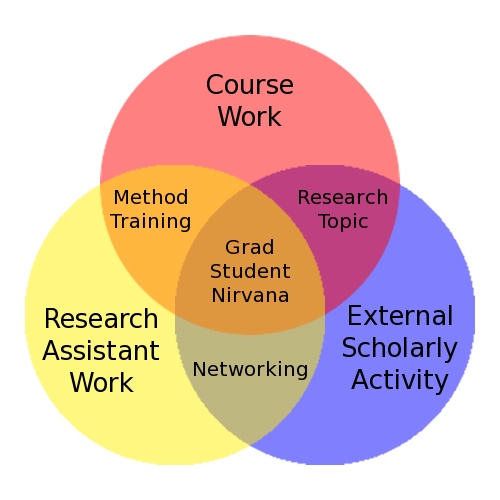The Digital History Fellows occupy a fairly unique role amongst the many graduate students currently studying in the humanities. We have been given research stipends to support the growth of our research capabilities, with particular emphasis on digital research methods. Because we are attached to the RRCHNM, our concentrated efforts are focused on specific projects, to which we contribute time and energy while developing digital methods and skills. We and the center benefit from the symbiotic relationship.
The model under which we operate is new, but the work of graduate students in the center long predates the fellowship. Graduate Research Assistants (GRAs) have been contributing to projects for many years; some have even stayed at the center as they moved into post-doctoral and faculty positions. In some ways, the DH Fellows embody a new form for an important and time-tested collaboration between senior staff and graduate students.
In the larger world of humanities research, however, graduate students might never have an opportunity to hone their research skills and cut their teeth on grant-funded projects. Many Research Assistants (RAs) operate as time-savers for their supervisory faculty members; they run photocopiers, summarize articles, collect resources, and return library books. Only rarely are they asked to contribute to original scholarship. For these reasons, the GRAs and DH Fellows at the RRCHNM are quite fortunate.
Every graduate student who participates in research projects has three primary forms of engagement with their chosen career: course work, research assistant work, and external scholarly activities. Course work usually involves reading books and articles, participating in class discussions, and producing scholarly work for credit. Research assistant work can range from photocopying to digital curation, and many things between, depending on the project. Finally, external scholarly activities include attending and presenting at conferences, writing articles, and participating in their field outside of their home institution.
Recently, I have observed a series of events and conversations that indicate the value of integrated graduate student collaboration. By itself, each activity described above cannot provide enough value for a graduate student to feel fulfilled. Course work alone becomes tedious and loses meaning without the sense of purpose that projects can provide. Furthermore, the intersection of those two activities creates a conversation about research methods that can be transferred between the two and benefit both. Similarly, attending conferences without a firm grasp on one’s field and research topics would be frustrating and fruitless. Moreover, contributing to projects can open doors for presentations and co-authorship that would otherwise take years to develop. Where these three activities overlap are spaces that create purpose and value for graduate students.
In my recent work at the RRCHNM, in my courses, and with external scholars, those overlapping spaces have blossomed. Conversations in class about the nature of digital humanities have informed research topics about digital pedagogy and scholarship that I’ve presented at conferences, where I’ve met other scholars who work on similar projects, who then make suggestions about my own dissertation topic. Each part is necessary for the others to function effectively. The individual parts of my daily life as a graduate student come together to create undeniable value for my work.
Graduate students at the RRCHNM, and at other centers of scholarship around the globe, are fortunate to have opportunities to find fulfillment through such activities. An important question, however, still remains: can universities provide such opportunities for more students? If not, are there other models that provide fulfillment for graduate students? The history department at GMU has worked with the RRCHNM to design the DH Fellowship as one possible answer, and so far, it is working.


Nice post, Spencer. I’ve been eavesdropping lately on the introductory blog posts at the Praxis program at UVA — worth a look if you haven’t already seen it: http://praxis.scholarslab.org/
I grabbed one of their posts for DHNow – they’re doing some very interesting things.